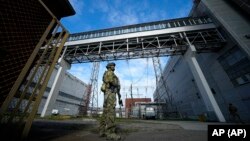A second backup power supply line has been reconnected to the Zaporizhzhya nuclear power plant, aiding in efforts to ensure the nuclear core is properly cooled, said the International Atomic Energy Agency (IAEA).
Reconnecting the second line has enabled the operator to keep one line in reserve while the other provides the plant with the external electricity needed for reactor cooling and other essential safety functions, the IAEA said in a statement on September 12.
The IAEA team onsite managed to power down the plant's sixth reactor, which now requires less power, it said. The agency said the reactor had "entered a cold shutdown state like the facility’s five other reactors" in a development significant for nuclear safety at Europe's largest nuclear power plant.
But IAEA chief Rafael Grossi said all four main power supply lines were still severed and the plant is not providing any power to the grid. He said the situation at the plant remains "precarious" and renewed his calls for the establishment of a security zone around the plant.
Grossi said earlier that Kyiv and Moscow have shown "signs that they are interested" in creating a security zone.
"What we need here really is Ukraine and Russia to agree on a very simple principle of not attacking or not shelling the plant," Grossi told reporters.
Both countries are engaging with the IAEA and asking many questions about the idea put forward by the UN nuclear watchdog to create the security zone, Grossi said.
The aim of the proposed zone is to prevent military activities like shelling that has damaged the plant's power lines and jeopardized its security, Grossi told a news conference in Vienna on September 12.
Russia seized control of the nuclear power plant shortly after Russian President Vladimir Putin launched his country’s unprovoked invasion of Ukraine on February 24. The plant's Ukrainian operators have remained onsite to run the plant.
On September 7, Ukrainian authorities urged residents in areas around the plant controlled by invading Russian forces to evacuate for their own safety.
French President Emmanuel Macron told Russian President Vladimir Putin in a phone call on September 11 that the plant's occupation by Russian troops was the reason its security has been compromised, the French presidency said. Putin blamed Ukrainian forces, according to a Kremlin statement.
Fighting around the plant, Europe's largest nuclear station, has raised fears of a potential nuclear disaster.
Russia has accused Ukraine of attempting to recapture the plant by force, allegations Kyiv denies.
Ukraine and the West accuse Russia of deploying heavy weaponry at the site, knowing Ukraine likely would not fire on it. Moscow denies those allegations but has resisted efforts to demilitarize the area in order to avert an environmental catastrophe.










